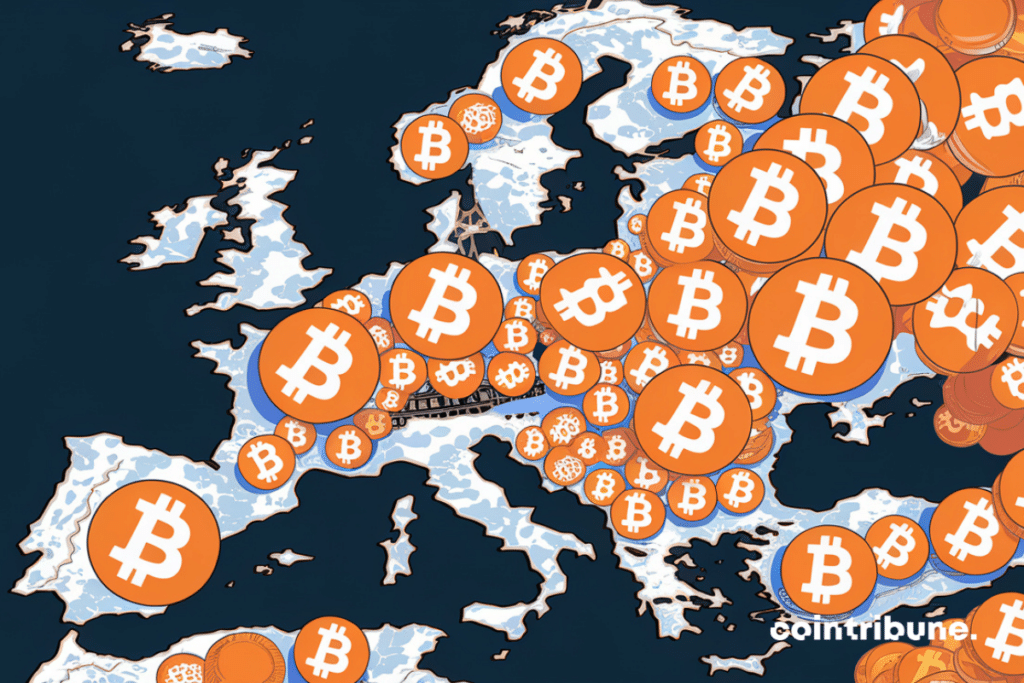Classement des pays ayant reçu le plus de cryptomonnaies (bitcoins, stablecoins, shitcoins)
— Nicolas Teterel (@NTeterel) October 17, 2024
[Transactions on-chain analysées par Chainalysis] pic.twitter.com/65GyqnmaeF
A
A
France Received $101 Billion In Cryptocurrencies
Thu 17 Oct 2024 ▪
4
min read ▪ by
Getting informed
▪
Payment
The surveillance firm Chainalysis today publishes its report on cryptocurrency adoption. France ranks on the European podium.

France Leading
With nearly 1 trillion dollars received in cryptos, Europe ranks second in the Global Cryptocurrency Adoption Index. The continent represents almost 21% of global transactions.
France received one-tenth of these cryptocurrencies, amounting to 101 billion dollars. Only the Germans and the English received more. France is ranked 22nd in the global index.
This relatively disappointing position for the seventh richest country in the world is because the ranking takes into account not only volumes. Many other parameters gauge adoption by the greatest number. For example, at equal volume, a country performing more transactions (of smaller amounts) will rank higher.
As in previous years, North America leads the way with an on-chain value estimated at 1.3 trillion dollars received between July 2023 and June 2024 (including about 340 billion BTC). That accounts for 22.5% of the world total. The United States ranks fourth in the standings.
The dominance of North America in the cryptocurrency market is largely fueled by institutional activity due to the launch of Bitcoin ETFs by giants like BlackRock or Fidelity. The share of transaction volume originating from transfers over 1 million dollars is much higher there than in the rest of the world.
Back on the old continent, transactions below 1 million dollars were mostly executed in stablecoins (52%). They are followed by altcoins (18%), and bitcoin and ethereum with 15% each.
The decline in BTC transactions in 2024 likely means that bitcoiners don’t want to part with it. The return of bitcoin to the historical high explains this.
Bitcoin and Stablecoins in Strong Growth in the East
Eastern Europe has become a global heavyweight with 500 billion dollars. In other words, the whole of Europe (including Russia, Poland, Ukraine, etc.) received the equivalent of 1.5 trillion dollars in cryptocurrencies, which is more than North America.
Ukraine and Russia are unsurprisingly the regional leaders. The two countries rank 6th and 7th respectively in the global index. Russia gains six places compared to last year.
Russians are increasingly using bitcoin and stablecoins for international transactions hampered by Western sanctions. The country is indeed disconnected from the SWIFT network, which complicates the lives of exporters and importers.
Ukrainians also use it to escape conscription. The credit cards of draftees are systematically deactivated for foreign payments. Bitcoin and other cryptocurrencies are then used to flee. Money laundering via “donations” for Ukraine is another explanation.
The Chainalysis report aligns with our interview with the CEO of the Russian exchange kickex. Anti Danilevski notably stated:
“The adoption of cryptos in Russia is largely driven by the need to transfer money abroad due to sanctions and the challenges posed by international financial restrictions. Many Russians, particularly IT specialists and their families living abroad in countries like Thailand or Bali, have turned to cryptocurrencies to send and receive money. And not just bitcoin. Stablecoins are also widely used.”
Gradually, bitcoin and stablecoins are flourishing in every corner of the world. More information can be found in the annual report which will be published today. Here is our article on last year’s report.
Maximize your Cointribune experience with our "Read to Earn" program! For every article you read, earn points and access exclusive rewards. Sign up now and start earning benefits.
A
A
Bitcoin, geopolitical, economic and energy journalist.
DISCLAIMER
The views, thoughts, and opinions expressed in this article belong solely to the author, and should not be taken as investment advice. Do your own research before taking any investment decisions.